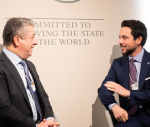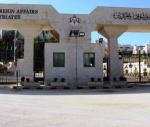You are here
Khamenei orders Iran unrest victims treated as 'martyrs'
By AFP - Dec 06,2019 - Last updated at Dec 06,2019
TEHRAN — Iran's supreme leader has agreed that people killed in nationwide unrest last month who had no role in fomenting it should be treated as "martyrs" with their families compensated.
Ayatollah Ali Khamenei's decision marked a significant softening of position by the Iranian authorities towards those killed during the protests that erupted on November 15 following a surprise hike in fuel prices.
He was responding to a report on the protests he commissioned from Iran's Supreme National Security Council, his official website said Wednesday.
He ordered that its recommendations "be implemented as soon as possible".
Iran has yet to give overall figures for the number of people killed or arrested when security forces moved in to quell the unrest that saw buildings torched and shops looted.
London-based human rights group Amnesty International said on Monday that at least 208 people had died.
But Iran has dismissed the high death tolls reported by foreign sources as "utter lies" and has so far confirmed only five dead — four security force personnel killed by "rioters" and one civilian.
Khamenei agreed that “ordinary citizens with no role in the recent protests and riots who died in the clashes” should be treated as “martyrs” with their families eligible for support from the Martyrs and Veterans Foundation.
Iran usually grants the title of martyr to soldiers killed on duty and the foundation is tasked with providing their families with financial benefits and better housing, employment and education opportunities.
Khamenei said that families whose loved ones “lost their lives in any way during the demonstrations” would be “paid their blood money as restitution”.
Blood money is an Islamic legal term for financial compensation payable by law to the families of murder victims.
Even the families of those “killed while armed and in clashes with security forces” would not be held accountable for their loved ones’ actions but would be shown “Islamic clemency” and “compensated proportionally”, Khamenei’s statement said.
‘Innocents’
The recommendations contrast with the firmness shown by the government from the very beginning of the unrest, during which they ordered a near-total Internet blackout that lasted for more than a week.
Iran has blamed the violence that broke out during the protests on “thugs” backed by its foes the United States, Israel and Saudi Arabia.
It has singlled out exiled royalists and the People’s Mujahedeen of Iran (MEK), an exiled former rebel group which it considers a “terrorist” cult.
“The people foiled a deep, vast and very dangerous conspiracy on which a lot of money was spent for destruction, viciousness and the killing of people,” Khamenei said on state television.
Last month, the Revolutionary Guards praised the “timely” action taken against “rioters”.
The guards’ deputy commander Rear Admiral Ali Fadavi called for the severe punishment of “mercenaries” arrested in connection with the violence.
But as Internet connectivity was gradually restored, Iranians on social media mourned loved ones who had nothing to do with the riots and were killed simply for being in the wrong place at the wrong time.
President Hassan Rouhani acknowledged on Wednesday that “innocents” could be among those imprisoned in waves of mass arrests during and after the protests.
“All those people who have been arrested, of course some of them are innocent and should be freed,” Rouhani said in an address broadcast by state television.
Related Articles
TEHRAN — Iran on Wednesday executed a man convicted of killing a member of the Revolutionary Guard during deadly protests in 2017-18, the ju
TEHRAN — More than 200 people have been killed in Iran since nationwide protests erupted over the death in police custody of Mahsa Amini, th
TEHRAN — A delegation from Iran's supreme leader Ayatollah Ali Khamenei expressed sadness and promised solutions in a visit to a south-easte
















